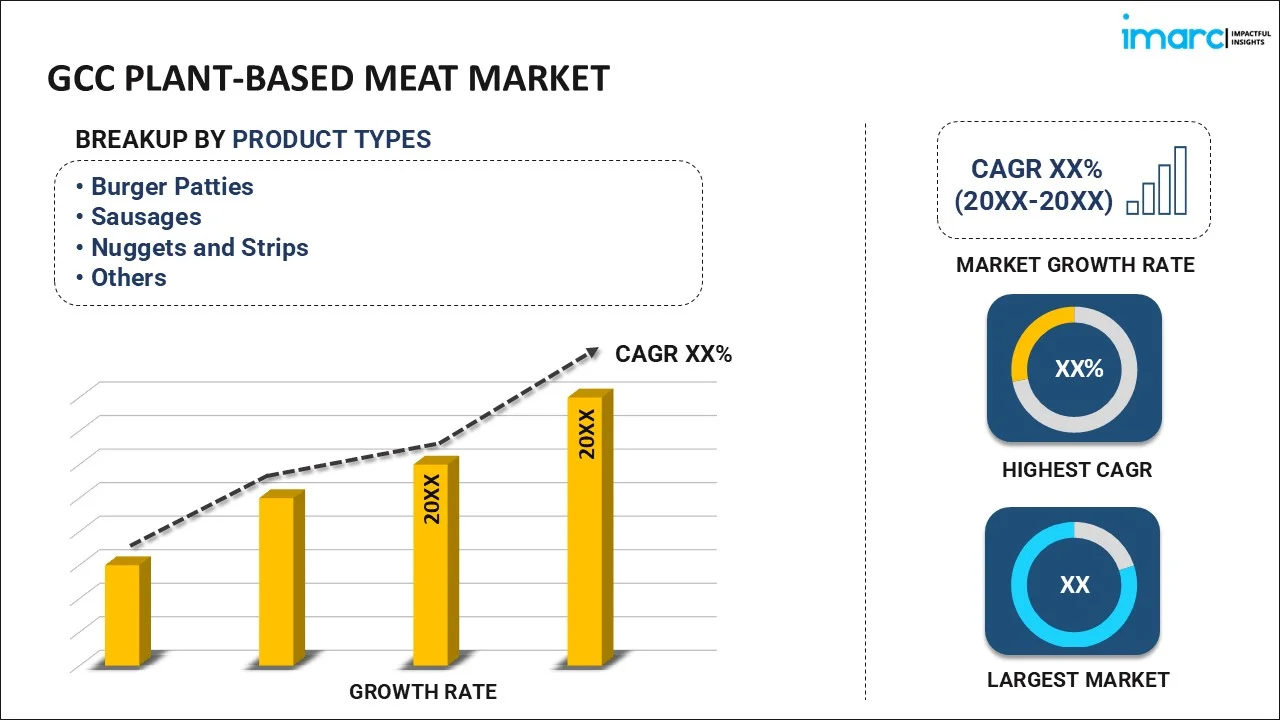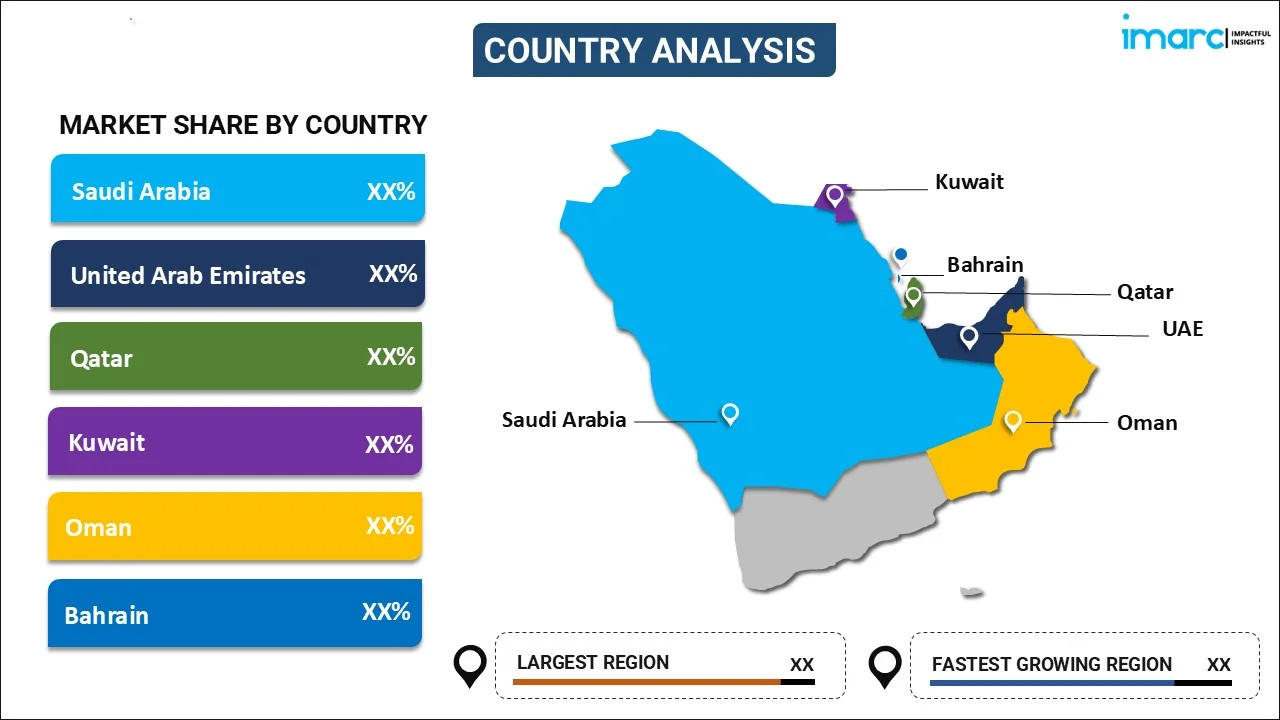
GCC Plant-Based Meat Market Report by Product Type (Burger Patties, Sausages, Nuggets and Strips, Ground Meat, Meatballs, and Others), Source (Soy, Wheat, Peas, and Others), Meat Type (Chicken, Beef, Pork, and Others), Distribution Channel (Restaurant and Catering Industry, Supermarkets and Hypermarkets, Convenience and Specialty Stores, Online Retail), and Country 2026-2034
Market Overview:
The GCC plant-based meat market size reached USD 357.6 Million in 2025. Looking forward, IMARC Group expects the market to reach USD 924.2 Million by 2034, exhibiting a growth rate (CAGR) of 11.13% during 2026-2034. The growing environmental awareness among the masses, the introduction of innovative product variants, the rising awareness about animal welfare and ethical concerns, and the growing trend of veganism represent some of the key factors driving the market.
|
Report Attribute
|
Key Statistics
|
|---|---|
|
Base Year
|
2025 |
|
Forecast Years
|
2026-2034
|
|
Historical Years
|
2020-2025
|
| Market Size in 2025 | USD 357.6 Million |
| Market Forecast in 2034 | USD 924.2 Million |
| Market Growth Rate (2026-2034) | 11.13% |
Access the full market insights report Request Sample
Plant-based meat refers to food products that are designed to replicate the taste, texture, and appearance of traditional animal-based meat but are made entirely from plant-derived ingredients. These products are created using a combination of plant proteins, fats, and other ingredients to mimic the sensory experience of consuming meat without the use of actual animal products. Plant-based meat alternatives offer a way for individuals to enjoy familiar flavors and dishes while opting for a more sustainable and ethical food source. These products are seasoned and flavored to resemble the taste of various types of animal-based meats. Natural flavors, spices, and additives are used to achieve the desired taste profile. Moreover, they come in various forms, including burgers, sausages, ground meat, meatballs, nuggets, and more. They are designed to be cooked, seasoned, and enjoyed just like traditional meat, allowing consumers to create familiar dishes while reducing their consumption of animal products. The growing popularity of plant-based meat aligns with consumer interests in health, sustainability, animal welfare, and dietary choices that have a lower environmental impact.
GCC Plant-Based Meat Market Trends:
Health-conscious consumers in the GCC region are increasingly seeking alternatives to traditional meat products due to concerns about saturated fats, cholesterol, and the potential health risks associated with excessive meat consumption. In addition, the growing environmental awareness is driving demand for more sustainable food options. The livestock industry is associated with significant greenhouse gas emissions, land use, and water consumption. Plant-based meat, which requires fewer natural resources to produce, aligns with consumers' desire to reduce their ecological footprint and support more environmentally friendly choices. Besides, the GCC region is witnessing a rise in awareness about animal welfare and ethical concerns related to conventional meat production. Plant-based meat provides an ethical alternative by eliminating the need for animal slaughter and addressing the ethical considerations associated with traditional meat consumption. Moreover, the market has witnessed a surge in innovative product development. Companies are creating plant-based meat alternatives that closely mimic the taste, texture, and appearance of traditional meat, making it easier for consumers to transition to plant-based options without sacrificing culinary experiences. Furthermore, celebrity endorsements and influencer-led campaigns have contributed to raising awareness about plant-based diets and meat alternatives. Such endorsements influence consumer perceptions and encourage trial of plant-based meat products, thus propelling the market. Apart from this, the increased demand for plant-based meat alternatives in both retail and foodservice sectors is driving manufacturers and restaurants to expand their offerings. As more restaurants and fast-food chains introduce plant-based options, consumers are becoming more familiar and comfortable with incorporating plant-based choices into their meals.
GCC Plant-Based Meat Market Segmentation:
IMARC Group provides an analysis of the key trends in each segment of the GCC plant-based meat market report, along with forecasts at the regional and country level for 2026-2034. Our report has categorized the market based on product type, source, meat type, and distribution channel.
Product Type Insights:

To get detailed segment analysis of this market Request Sample
- Burger Patties
- Sausages
- Nuggets and Strips
- Ground Meat
- Meatballs
- Others
The report has provided a detailed breakup and analysis of the market based on the product type. This includes burger patties, sausages, nuggets and strips, ground meat, meatballs, and others.
Source Insights:
- Soy
- Wheat
- Peas
- Others
The report has provided a detailed breakup and analysis of the market based on the source. This includes soy, wheat, peas, and others.
Meat Type Insights:
- Chicken
- Beef
- Pork
- Others
The report has provided a detailed breakup and analysis of the market based on the meat type. This includes chicken, beef, pork, and others.
Distribution Channel Insights:
- Restaurant and Catering Industry
- Supermarkets and Hypermarkets
- Convenience and Specialty Stores
- Online Retail
The report has provided a detailed breakup and analysis of the market based on distribution channel. This includes restaurant and catering industry, supermarkets and hypermarkets, convenience and specialty stores, and online retail.
Country Insights:

To get detailed regional analysis of this market Request Sample
- Saudi Arabia
- UAE
- Qatar
- Bahrain
- Kuwait
- Oman
The report has also provided a comprehensive analysis of all the major regional markets, which include Saudi Arabia, UAE, Qatar, Bahrain, Kuwait, and Oman.
Competitive Landscape:
The report has also provided a comprehensive analysis of the competitive landscape in the market. Competitive analysis such as market structure, key player positioning, top winning strategies, competitive dashboard, and company evaluation quadrant has been covered in the report. Also, detailed profiles of all major companies have been provided.
GCC Plant-Based Meat Market Report Coverage:
| Report Features | Details |
|---|---|
| Base Year of the Analysis | 2025 |
| Historical Period | 2020-2025 |
| Forecast Period | 2026-2034 |
| Units | Million USD |
| Scope of the Report | Exploration of Historical and Forecast Trends, Industry Catalysts and Challenges, Segment-Wise Historical and Predictive Market Assessment:
|
| Product Types Covered | Burger Patties, Sausages, Nuggets and Strips, Ground Meat, Meatballs, Others |
| Sources Covered | Soy, Wheat, Peas, Others |
| Meat Types Covered | Chicken, Beef, Pork, Others |
| Distribution Channels Covered | Restaurant and Catering Industry, Supermarkets and Hypermarkets, Convenience and Specialty Stores, Online Retail |
| Countries Covered | Saudi Arabia, UAE, Qatar, Bahrain, Kuwait, Oman |
| Customization Scope | 10% Free Customization |
| Post-Sale Analyst Support | 10-12 Weeks |
| Delivery Format | PDF and Excel through Email (We can also provide the editable version of the report in PPT/Word format on special request) |
Key Questions Answered in This Report:
- How has the GCC plant-based meat market performed so far and how will it perform in the coming years?
- What has been the impact of COVID-19 on the GCC plant-based meat market?
- What is the breakup of the GCC plant-based meat market on the basis of product type?
- What is the breakup of the GCC plant-based meat market on the basis of source?
- What is the breakup of the GCC plant-based meat market on the basis of meat type?
- What is the breakup of the GCC plant-based meat market on the basis of distribution channel?
- What are the various stages in the value chain of the GCC plant-based meat market?
- What are the key driving factors and challenges in the GCC plant-based meat market?
- What is the structure of the GCC plant-based meat market and who are the key players?
- What is the degree of competition in the GCC plant-based meat market?
Key Benefits for Stakeholders:
- IMARC’s report offers a comprehensive quantitative analysis of various market segments, historical and current market trends, market forecasts, and dynamics of the GCC plant-based meat market from 2020-2034.
- The research study provides the latest information on the market drivers, challenges, and opportunities in the GCC plant-based meat market.
- Porter's five forces analysis assist stakeholders in assessing the impact of new entrants, competitive rivalry, supplier power, buyer power, and the threat of substitution. It helps stakeholders to analyze the level of competition within the GCC plant-based meat industry and its attractiveness.
- Competitive landscape allows stakeholders to understand their competitive environment and provides an insight into the current positions of key players in the market.
Need more help?
- Speak to our experienced analysts for insights on the current market scenarios.
- Include additional segments and countries to customize the report as per your requirement.
- Gain an unparalleled competitive advantage in your domain by understanding how to utilize the report and positively impacting your operations and revenue.
- For further assistance, please connect with our analysts.
 Request Customization
Request Customization
 Speak to an Analyst
Speak to an Analyst
 Request Brochure
Request Brochure
 Inquire Before Buying
Inquire Before Buying




.webp)




.webp)












